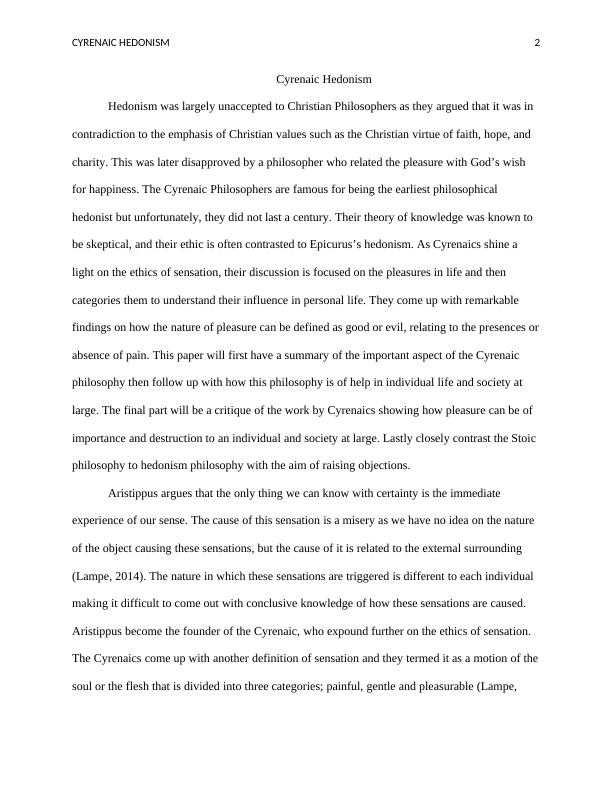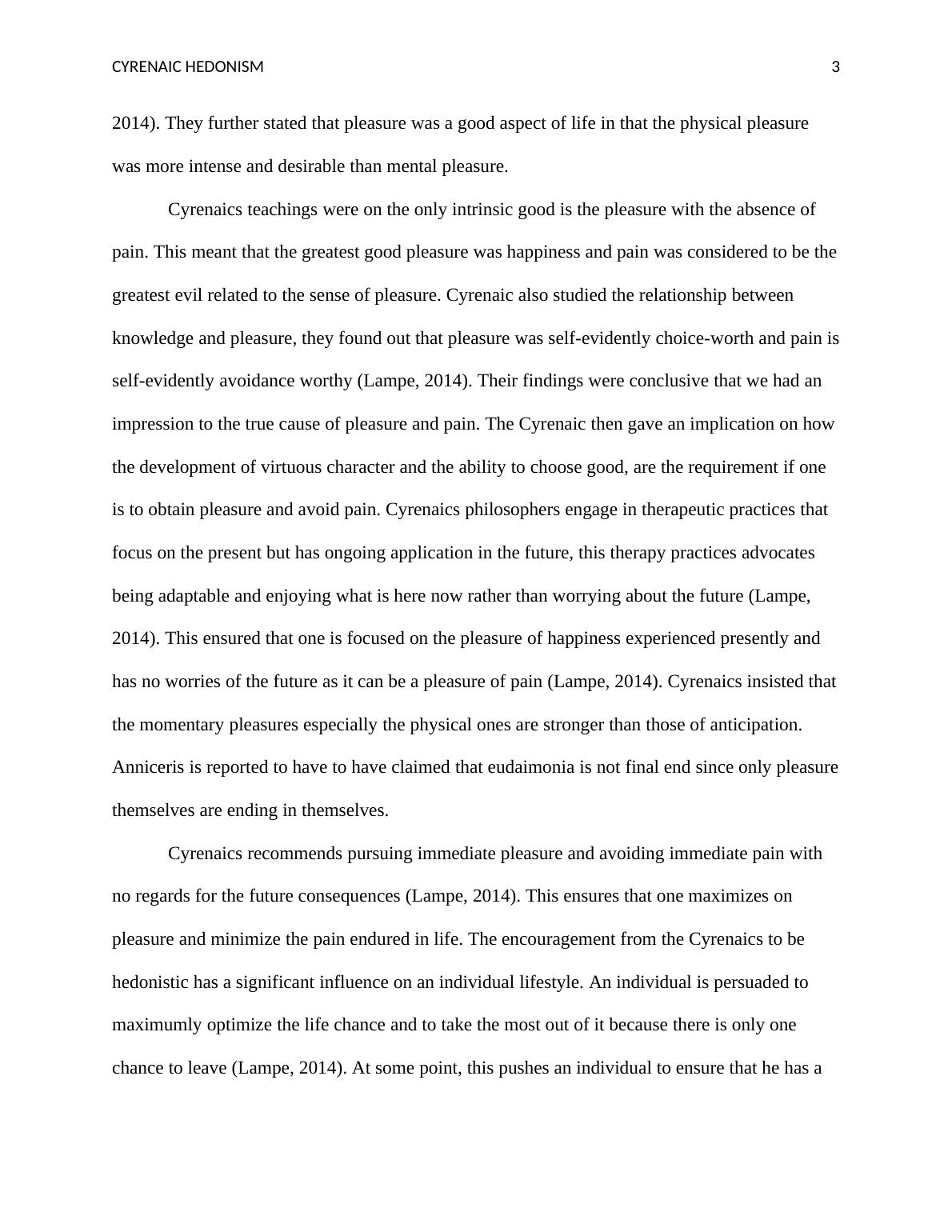PHIL 1000 - Introduction to Philosophy
6 Pages1443 Words47 Views
Introductory Philosophy (PHIL 1000)
Added on 2021-10-28
PHIL 1000 - Introduction to Philosophy
Introductory Philosophy (PHIL 1000)
Added on 2021-10-28
ShareRelated Documents
Running head: CYRENAIC HEDONISM 1
Cyrenaic Hedonism
Name
Institution
Cyrenaic Hedonism
Name
Institution

CYRENAIC HEDONISM2
Cyrenaic Hedonism
Hedonism was largely unaccepted to Christian Philosophers as they argued that it was in
contradiction to the emphasis of Christian values such as the Christian virtue of faith, hope, and
charity. This was later disapproved by a philosopher who related the pleasure with God’s wish
for happiness. The Cyrenaic Philosophers are famous for being the earliest philosophical
hedonist but unfortunately, they did not last a century. Their theory of knowledge was known to
be skeptical, and their ethic is often contrasted to Epicurus’s hedonism. As Cyrenaics shine a
light on the ethics of sensation, their discussion is focused on the pleasures in life and then
categories them to understand their influence in personal life. They come up with remarkable
findings on how the nature of pleasure can be defined as good or evil, relating to the presences or
absence of pain. This paper will first have a summary of the important aspect of the Cyrenaic
philosophy then follow up with how this philosophy is of help in individual life and society at
large. The final part will be a critique of the work by Cyrenaics showing how pleasure can be of
importance and destruction to an individual and society at large. Lastly closely contrast the Stoic
philosophy to hedonism philosophy with the aim of raising objections.
Aristippus argues that the only thing we can know with certainty is the immediate
experience of our sense. The cause of this sensation is a misery as we have no idea on the nature
of the object causing these sensations, but the cause of it is related to the external surrounding
(Lampe, 2014). The nature in which these sensations are triggered is different to each individual
making it difficult to come out with conclusive knowledge of how these sensations are caused.
Aristippus become the founder of the Cyrenaic, who expound further on the ethics of sensation.
The Cyrenaics come up with another definition of sensation and they termed it as a motion of the
soul or the flesh that is divided into three categories; painful, gentle and pleasurable (Lampe,
Cyrenaic Hedonism
Hedonism was largely unaccepted to Christian Philosophers as they argued that it was in
contradiction to the emphasis of Christian values such as the Christian virtue of faith, hope, and
charity. This was later disapproved by a philosopher who related the pleasure with God’s wish
for happiness. The Cyrenaic Philosophers are famous for being the earliest philosophical
hedonist but unfortunately, they did not last a century. Their theory of knowledge was known to
be skeptical, and their ethic is often contrasted to Epicurus’s hedonism. As Cyrenaics shine a
light on the ethics of sensation, their discussion is focused on the pleasures in life and then
categories them to understand their influence in personal life. They come up with remarkable
findings on how the nature of pleasure can be defined as good or evil, relating to the presences or
absence of pain. This paper will first have a summary of the important aspect of the Cyrenaic
philosophy then follow up with how this philosophy is of help in individual life and society at
large. The final part will be a critique of the work by Cyrenaics showing how pleasure can be of
importance and destruction to an individual and society at large. Lastly closely contrast the Stoic
philosophy to hedonism philosophy with the aim of raising objections.
Aristippus argues that the only thing we can know with certainty is the immediate
experience of our sense. The cause of this sensation is a misery as we have no idea on the nature
of the object causing these sensations, but the cause of it is related to the external surrounding
(Lampe, 2014). The nature in which these sensations are triggered is different to each individual
making it difficult to come out with conclusive knowledge of how these sensations are caused.
Aristippus become the founder of the Cyrenaic, who expound further on the ethics of sensation.
The Cyrenaics come up with another definition of sensation and they termed it as a motion of the
soul or the flesh that is divided into three categories; painful, gentle and pleasurable (Lampe,

CYRENAIC HEDONISM3
2014). They further stated that pleasure was a good aspect of life in that the physical pleasure
was more intense and desirable than mental pleasure.
Cyrenaics teachings were on the only intrinsic good is the pleasure with the absence of
pain. This meant that the greatest good pleasure was happiness and pain was considered to be the
greatest evil related to the sense of pleasure. Cyrenaic also studied the relationship between
knowledge and pleasure, they found out that pleasure was self-evidently choice-worth and pain is
self-evidently avoidance worthy (Lampe, 2014). Their findings were conclusive that we had an
impression to the true cause of pleasure and pain. The Cyrenaic then gave an implication on how
the development of virtuous character and the ability to choose good, are the requirement if one
is to obtain pleasure and avoid pain. Cyrenaics philosophers engage in therapeutic practices that
focus on the present but has ongoing application in the future, this therapy practices advocates
being adaptable and enjoying what is here now rather than worrying about the future (Lampe,
2014). This ensured that one is focused on the pleasure of happiness experienced presently and
has no worries of the future as it can be a pleasure of pain (Lampe, 2014). Cyrenaics insisted that
the momentary pleasures especially the physical ones are stronger than those of anticipation.
Anniceris is reported to have to have claimed that eudaimonia is not final end since only pleasure
themselves are ending in themselves.
Cyrenaics recommends pursuing immediate pleasure and avoiding immediate pain with
no regards for the future consequences (Lampe, 2014). This ensures that one maximizes on
pleasure and minimize the pain endured in life. The encouragement from the Cyrenaics to be
hedonistic has a significant influence on an individual lifestyle. An individual is persuaded to
maximumly optimize the life chance and to take the most out of it because there is only one
chance to leave (Lampe, 2014). At some point, this pushes an individual to ensure that he has a
2014). They further stated that pleasure was a good aspect of life in that the physical pleasure
was more intense and desirable than mental pleasure.
Cyrenaics teachings were on the only intrinsic good is the pleasure with the absence of
pain. This meant that the greatest good pleasure was happiness and pain was considered to be the
greatest evil related to the sense of pleasure. Cyrenaic also studied the relationship between
knowledge and pleasure, they found out that pleasure was self-evidently choice-worth and pain is
self-evidently avoidance worthy (Lampe, 2014). Their findings were conclusive that we had an
impression to the true cause of pleasure and pain. The Cyrenaic then gave an implication on how
the development of virtuous character and the ability to choose good, are the requirement if one
is to obtain pleasure and avoid pain. Cyrenaics philosophers engage in therapeutic practices that
focus on the present but has ongoing application in the future, this therapy practices advocates
being adaptable and enjoying what is here now rather than worrying about the future (Lampe,
2014). This ensured that one is focused on the pleasure of happiness experienced presently and
has no worries of the future as it can be a pleasure of pain (Lampe, 2014). Cyrenaics insisted that
the momentary pleasures especially the physical ones are stronger than those of anticipation.
Anniceris is reported to have to have claimed that eudaimonia is not final end since only pleasure
themselves are ending in themselves.
Cyrenaics recommends pursuing immediate pleasure and avoiding immediate pain with
no regards for the future consequences (Lampe, 2014). This ensures that one maximizes on
pleasure and minimize the pain endured in life. The encouragement from the Cyrenaics to be
hedonistic has a significant influence on an individual lifestyle. An individual is persuaded to
maximumly optimize the life chance and to take the most out of it because there is only one
chance to leave (Lampe, 2014). At some point, this pushes an individual to ensure that he has a

End of preview
Want to access all the pages? Upload your documents or become a member.
Related Documents
Utilitarianism: Mill's Arguments | Principle of Utilitylg...
|12
|1532
|44
Ancient History Theory 2022lg...
|5
|995
|29
Comparison between Stoicism and Epicureanism Discussion 2022lg...
|6
|1052
|28
Philosophylg...
|4
|712
|294
Aristotle on Nature of Ethicslg...
|4
|705
|363
